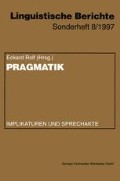Abstract
In the past decades, there has been much progress in the formal Semantics of ordinary language. Logicians, linguists and philosophers have extensively used logical formalisms in order to interpret directly or after translation important fragments of actual natural languages. They have thereby contributed to the foundations of the theory of sentence meaning. In formal Semantics, speaker meaning is reduced to sentence meaning: one assumes that speakers only mean what they say. Thus, formal semantics is a theory of literal meaning. However, in ordinary conversations, the speaker’s meaning is often different from the sentence meaning. First, the primary illocutionary act that the speaker attempts to perform is different from the literal speech act expressed by the uttered sentence in the cases of metaphor, irony and indirect speech acts. Whenever the speaker indirectly requests the hearer to pass the salt by asking “Can you pass the salt?”, the primary speech act of the utterance is the indirect request and not the literal question about the hearer’s abilities. Second, the speaker means to perform secondary non literal illocutionary acts in the cases of conversational implicatures. By saying “If you are nice, I will give you something” the speaker can imply conversationally that he will not give anything to the hearer if he is not nice. In such a case, he makes a secondary non literal assertion in addition to the primary conditional promise. The speaker’s capacity to make and understand non literal speech acts is clearly part of his linguistic competence. But it exceeds the capacity of understanding the sentence meaning.
I am grateful to Steven Davis, François Lepage, Kenneth Mac Queen, Claude Panaccio, John Searle and Dietmar Zaefferer for helpful comments on a first draft of this paper.
Access this chapter
Tax calculation will be finalised at checkout
Purchases are for personal use only
Preview
Unable to display preview. Download preview PDF.
References
Austin, J.L. (1962): How to Do Things with Words. Oxford: Clarendon Press.
Bach, K. & R. Harnish (1979): Linguistic Communication and Speech Acts. Cambridge: The MIT Press.
Dascal, M. (1990): “On the Pragmatic Structure of Conversation”. In: J.R. Searle et al., eds. (1990), 35–56.
Grice, H.P. (1975): “Logic and Conversation”. In: P. Cole & J.L. Morgan, eds.: Syntax and Semantics. Vol. 3, Speech acts. New York: Academic Press, 41–58.
Kasher, A. (1982): “Gricean Inference Revisited”. Philosophica 29, III, 25–44.
Montague, R. (1974): Formal Philosophy. New Haven: Yale University Press.
Searle, J.R. (1979): Expression and Meaning. Cambridge: Cambridge University Press.
Searle, J.R. & D. Vanderveken (1985): Foundations of Illocutionary Logic. Cambridge: Cambridge University Press.
Searle, J.R. et al., eds. (1990): (On) Searle on Conversation. Amsterdam: Benjamins.
Sperber D. & D. Wilson (1986): Relevance. Cambridge: Harvard University Press.
Vanderveken, D. (1991): “Non Literal Speech Acts and Conversational Maxims”. In: E. Lepore & R. Van Gulick, eds.: John Searle and his Critics. Oxford: Blackwell, 371–384.
Vanderveken, D. (1990–1991): Meaning and Speech Acts. Vol. 1, Principles of Language Use. Vol. 2, Formal Semantics of Success and Satisfaction. Cambridge: Cambridge University Press.
Wittgenstein, L. (1968): Philosophical Investigations. Oxford: Blackwell.
Author information
Authors and Affiliations
Editor information
Editors and Affiliations
Rights and permissions
Copyright information
© 1997 Springer Fachmedien Wiesbaden
About this chapter
Cite this chapter
Vanderveken, D. (1997). Formal Pragmatics of Non Literal Meaning. In: Rolf, E. (eds) Pragmatik. Linguistische Berichte. VS Verlag für Sozialwissenschaften, Wiesbaden. https://doi.org/10.1007/978-3-663-11116-0_19
Download citation
DOI: https://doi.org/10.1007/978-3-663-11116-0_19
Publisher Name: VS Verlag für Sozialwissenschaften, Wiesbaden
Print ISBN: 978-3-531-13105-4
Online ISBN: 978-3-663-11116-0
eBook Packages: Springer Book Archive

